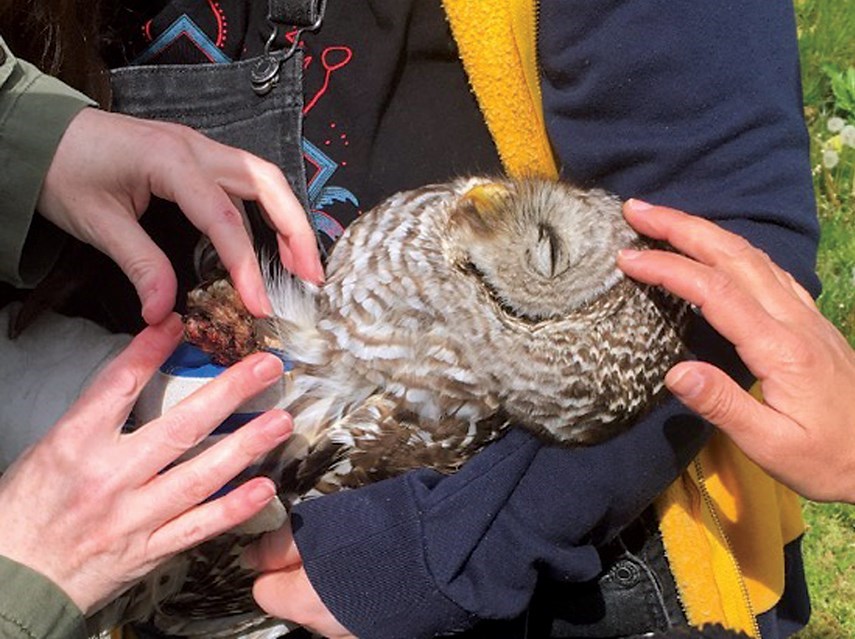Regulatory changes to the sale and use of rodenticides that travel up the food chain and harm wild animals will be permanent in British Columbia — welcome news to activists and rescue organizations that see the ill effects of the poison on an almost daily basis.
The Ministry of Environment announced Friday that widespread use and sale of second-generation anticoagulant rodenticides, also known as SGARs, will be permanently banned.
These types of poisons, commonly used in bait traps, are ingested by small rodents and other pests but do not kill them immediately. Deaths occur between four days and two weeks later, causing the animal to become increasingly slow and injured — easy pickings for predators.
But a predator that eats an affected animal is also at risk of lethal poisoning. Owls, hawks, crows, raccoons, coyotes, weasels, snakes and even house cats are at all risk. Birds of prey are particularly susceptible, given their dependence on rodents as a food source.
In July 2021, the provincial government established an 18-month ban on the sale and use of such poisons except for at essential services like hospitals and food production enterprises, as long as they were implemented by a licensed pest control company.
After consultation in 2022 with First Nations, local governments, the public, pest control operators, agricultural operators and more stakeholders, the ministry decided to make the ban permanent.
“The regulation will prohibit the sale and use of SGARs in B.C. for all members of the public, and most commercial and industrial operations,” reads a statement from the ministry released Friday.
Essential service businesses will need to hold a certificate and licence to use them, have a site-specific integrated pest-management plan and record the poison’s usage.
The campaign to ban rodenticides has been around for years but it picked up a lot of steam in 2020 when North Vancouver activist Yasmin Abidi helped rescue a young barred owl dubbed “Lucky” from poisoning in Heywood Park. It was the second time in a month the same bird had survived rodenticide poisoning, the Orphaned Wildlife Rescue Society confirmed.
Abidi circulated a petition that racked up almost 25,000 signatures calling for a ban, and lobbied all three North Shore municipalities to stop the use of anticoagulant poisons on their own properties. Councils around the Metro Vancouver soon adopted similar motions.
“I'm just so happy that it's going save a lot of horrific suffering and death. In the end, that was the whole point when I rescued Lucky who was basically dying in my arms,” she said. “An experience like that changes you. You can't not say anything.”
Rob Hope, general manager of the OWL rescue society said his group has been pleased with the news.
“We, unfortunately, get to see first hand the death and devastation that these poisons cause these birds,” he said “The second-generation anticoagulants are quite hardcore.”
Hope said they’ve seen a definite reduction in the number of birds being admitted for care with poisoning-like symptoms – paleness, bleeding from the mouth and eventual death – since the temporary ban was in place.
But, while the current ban may have been made permanent, it’s not necessarily a case of owl’s well that ends well and Abidi said her activism isn’t done yet. She too wants to see an end to first-generation poisons and fewer exemptions for businesses.
“Look, poison is poison and whatever you put in there is going to kill eventually,” she said.
Abidi has found herself in demand advising individual citizens and stratas on more wildlife-friendly ways of controlling the rodent population and she’s been lobbying the federal government to allow ContraPest – a non-toxic “birth control” for rodents – to be approved for use in Canada.
For Hope, he too would like to see more stringent rules in place when it comes to substances that may be deadly to wildlife.
“It's a great starting point and the people who went to battle to get this done. They’ve done a great job,” he said. “The science is there to back up everything we've been saying for years, and hopefully people will take into consideration the wildlife around us, as unfortunately we're encroaching on their habitats and environment. They're doing their best to adapt and if we let them take control of the rodents, we should be good.”
The first and best bit of advice Hope has for residents and business owners who want to keep their properties free of rats is to keep the grounds and building free of food a shelter spaces that may attract them in the first place. He also recommends using traditional snap traps, with a piece of plywood over top to prevent other critters from getting caught in them.


